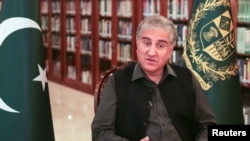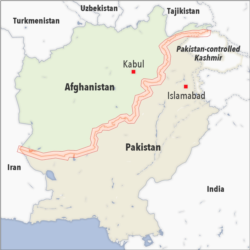Pakistan dismissed Tuesday the possibility of allowing the United States to operate a military base on Pakistani territory or conduct "kinetic drone” operations against Afghanistan.
Foreign Minister Shah Mehmood Qureshi’s statement came amid reports Islamabad is allegedly negotiating a new arrangement with Washington to facilitate future U.S. counterterrorism operations in the war-torn neighboring country following the withdrawal of international troops.
Qureshi rejected the reports as baseless and speculative.
“Let this house and the Pakistani nation be a witness to my testimony that under [Prime Minister] Imran Khan there will be no American base built on Pakistani soil. Forget about the past,” he told the upper house of the parliament.
“The government of Pakistan has categorically said that we will not allow kinetic use of drones nor are we interested in the surveillance of your drones. That’s a very clear-cut policy of this government,” Qureshi said.
The chief Pakistani diplomat delivered his speech a day after U.S. Defense Secretary Lloyd Austin spoke to Pakistan's Chief of Army Staff General Qamar Javed Bajwa.
That conversation followed Sunday’s meeting in Geneva between U.S. National Security Adviser Jake Sullivan and his Pakistani counterpart, Moeed Yusuf.
U.S. and Pakistani officials released few details of the meeting, though they said the contacts mostly focused on the evolving situation in Afghanistan.
The flurry of high-level contacts fueled speculation Islamabad and Washington were on the verge of striking a new cooperation deal to help counter future terrorist attacks against the U.S. once the withdrawal from Afghanistan is complete.
Qureshi’s statement came a day after Russia's presidential envoy for Afghanistan, Zamir Kabulov, said that the turmoil-hit nation’s Central Asian neighbors, Tajikistan and Uzbekistan, will not allow the U.S. to establish military bases on their territories.
U.S. President Joe Biden directed the remaining around 2,500 U.S. troops and roughly 7,000 NATO partners to leave Afghanistan by September 11.
The foreign troop drawdown started on May 1 and the U.S. military said Tuesday it had already completed “between 16-25% of the retrograde process.”
Pakistan shares a 2,600-kilometer border with Afghanistan, and Pakistani military bases, as well as ground and air lines of communication, played a vital role in facilitating and sustaining the U.S.-led military invasion of the neighboring country 20 years ago.
The punitive military action was undertaken to oust the Islamist Taliban from power days after the September 11, 2001, attacks on the U.S. that were plotted by al-Qaida leaders from Taliban-ruled Afghanistan at the time.
Pakistan has long retaken control of its bases, though its airspace and land routes are still being used to ferry nonlethal military supplies for international forces across the Afghan border and facilitating the ongoing U.S. troop drawdown process.
Pakistani Prime Minister Khan, who has long opposed the foreign military invasion of Afghanistan, took office about three years ago and has since repeatedly vowed that his country will become "only partners in peace” and not join any future U.S. war.
Qureshi reiterated Tuesday that Pakistan is in favor of a “responsible” and “orderly” withdrawal of the U.S. military.
“We are concerned that a vacuum if created in Afghanistan can drag and suck the country into the decade of the [19]90s and there will be anarchy there, there will be civil war God forbid,” he said.
Qureshi recounted efforts Pakistani is making to facilitate peace and reconciliation between the U.S.-backed government and the Taliban insurgency in Afghanistan.
He noted that Washington and the rest of the global community are “appreciative” of Islamabad’s role as a “responsible neighbor” in advancing the Afghan peace process.
Pakistan maintains close ties with the Taliban and U.S. officials have been pressing the country to use its leverage over the insurgents and convince them to negotiate a peace deal to end Afghan hostilities.
“Without going into the details, Pakistan is playing its role,” Foreign Minister Qureshi told the Senate session. “There are things that are visible to you and then there are things that are currently not visible to you today, but the history will recall the role Pakistan is playing and it ought to play.”
“Our objective is peace and stability in Afghanistan. We want to see prosperity, we want to see progress because in your progress lies my progress,” he said.






